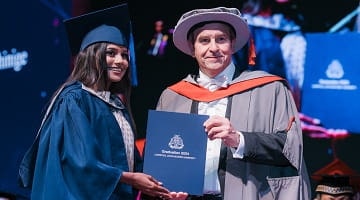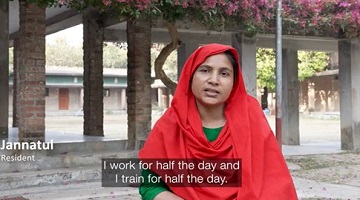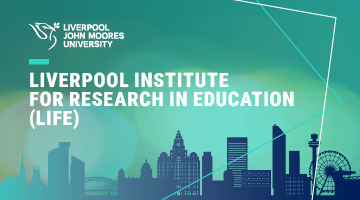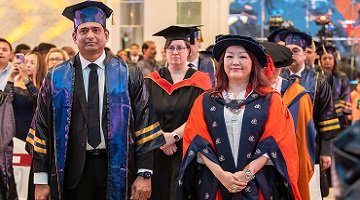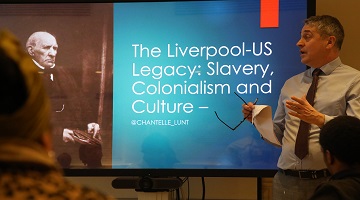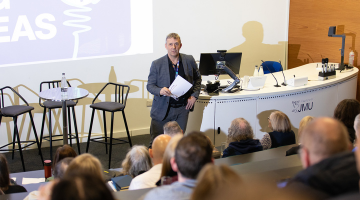Why study this course with LJMU?
- Stepping stone to a wide range of careers which focus on supporting children and families during primary phase education, including teaching, social care, health and childcare
- 94% of students surveyed said the teaching staff on our education courses were good at explaining things (NSS 2024)
- Extensive work-related learning opportunities
- Explore the sociological, historical, political, psychological and philosophical issues that impact on the lives and learning of young children
- Tailor your studies to your own interests through optional modules
- Graduate with a solid foundation for a child-centred career
- You are able to apply for a PGCE course, if you meet the entry requirements, which you would complete once you have graduated from this course. Completion of a PGCE would enable you to become a teacher. If you are looking for an undergraduate teacher training course now, we offer BA (Hons) Primary Education with QTS.
About your course
By completing the BA (Hons) Education and Primary Studies at Liverpool John Moores University you will be able to significantly contribute to children's future development and educational attainment.
Children's future development and educational attainment depends on high quality provision and experiences during primary phase education. This course explores recent initiatives and the influence of historical and key primary phase pioneers on current practice. You will also examine how young children develop and learn and explore both national and international approaches to primary provision, policy and practice.
The course brings together all aspects of education such as the effects of poverty and social exclusion, and curriculum development. The needs and rights of children, and your moral and professional role in working with them, will form the foundation of your professional development and academic studies.
You will study education it its broadest sense, drawing on aspects of sociology, history, politics, psychology and philosophy to give you an understanding of current educational thinking and practice. We signpost you to appropriate volunteer opportunities and activities in schools and other placements, so that you can gain the experience and practice you need before embarking on further training, study or a career.
We have several international links, and there are opportunities to visit other countries and also undertake a work-related placement overseas.
You will be able to tailor your studies to your own interests through option modules, research and work-related practice. Not only will you graduate with a solid foundation for a child-centred career, you will also gain key transferable skills, such as interpersonal, oral and written skills that are so crucial in the workplace today
Additional course costs
There are no costs for off site day trips embedded into core and option modules. Optional international placements will have a cost attached.
Course modules
What you will study on this degree
Further guidance on modules
Modules are designated core or optional in accordance with professional body requirements, as applicable, and LJMU’s Academic Framework Regulations. Whilst you are required to study core modules, optional modules provide you with an element of choice. Their availability may vary and will be subject to meeting minimum student numbers.
Where changes to modules are necessary these will be communicated as appropriate.
Core modules
Core modules
Optional Modules
Core modules
Optional Modules
Your Learning Experience
Excellent facilities and learning resources
The course aims to produce graduates who are able to think in a critical and analytical manner, reflecting upon issues that relate to education and community issues in the widest context. The course is designed to develop the transferable skills that will allow you to operate creatively in an increasingly complex world.
It is this ability, coupled with the transferable skills that are taught, such as the ability to evaluate and analyse information, 'people skills', computer literacy, oral and written skills and the ability to work effectively in demanding contexts, that make our graduates highly employable.
Teaching on the course is via a combination of lectures, seminars, tutorials, workshops, use of ICT, placement experience, online activities and independent learning.
Work-related Learning
The course has a strong element of work-related learning and you will have plenty of opportunities to look at practice in a wide variety of education and/or early years settings. You might also want to get an international perspective on your future career through work experience abroad or you could practice your teaching skills and get a feel for teaching during planned programme experiences or as voluntary activity.
Work experience is a vital element of your studies as it gives you a chance to put into practice what you have learnt during the course, and gain new skills as well. It will also add real value to your CV, giving you a head start when you come to negotiate your way around the competitive job market.
Dedicated personal tutor, plus study skills support
You will be assigned a personal tutor who will help and support you in your academic and personal progress throughout the course. This kind of one-to-one support is particularly useful for discussing course-related issues or concerns you may have during your studies.
Library Services teams also offer a fantastic range of support and guidance services, including online help guides, online chat facility and on-site help.
Our dedicated Student Advice and Wellbeing (SAW) team provide a wide range of services including accommodation advice, disability support, counselling and money matters.
Assessment varies depending on the modules you choose, but will usually include a combination of exams and coursework.
We recognise that all students perform differently depending on how they are being assessed, which is why we use a combination of assessment methods. Coursework may therefore include essays, reports, presentations, newspapers, posters, diaries and a dissertation. Exams are limited to the main core modules.
Constructive feedback is important in helping you to identify your strengths and areas where you may need to put in more work, so this will be provided regularly as you progress through each module.
Where you will study
Based in the Education Building in the heart of the Mount Pleasant campus, the School of Education features a wide range of cutting-edge facilities, including a pedagogy room, lecture rooms, computing facilities and a nearby outdoor learning. Students also benefit from independent study spaces, a close-by cafeteria and library, and access to student welfare and support.
Course tutors

Angela Garden
Programme leader
Our team of specialist academics, practitioners and support staff are dedicated to ensure you receive a first-class education.
Our team of specialist academics, practitioners and support staff are dedicated to ensure you receive a first-class education.
Ange has a firm background in Educational and Child Psychology. She has worked in a range of schools as a teacher, in various settings as a person-centred counsellor, worked with children in play and art therapy and as a researcher and lecturer firstly at Edge Hill University and for the past 10 years at LJMU. Ange researched and published in the field of non-directive play therapy for a number of years. A joint project with Barnardos saw the development of support groups for siblings of disabled children, with peer-reviewed publications emerging from it. Her more recent research concerns the psychological impact of a diagnosis of dyslexia upon the individual higher education student with a focus on their self-esteem and self-concept in relation to their diagnosis. This research has implications for practice at university level.


The course's strengths are the diverse range of topics covered, as well as the broad range of career options it ultimately gives you. I have now got a clear idea of the career path I hope to follow.
Career paths
However, if you choose to base your career on your primary phase specialism, there are openings within centres and community groups that focus on the needs of young children and their families.
Alternatively, your degree could lead to any number of careers such as in educational management, private nursery management, educational social work or any of the caring professions that involve young children.
The roles and career areas below represent just some of the many different pathways you could take with a BA (Hons) in Education and Primary Studies:
- Primary school teacher (upon completion of a PGDE/PGCE teacher training qualification)
- Learning support/mentor
- SEN and Inclusion
- Education administration
- Education management
- Central and local government careers
- Policy Worker
- Family support and social work roles
- Community education officer
- Youth and community work
- Social care roles
- Education Researcher
- Education/Children's publishing
- English as a foreign language teacher
- Further education tutor
- Drama and sports education roles
- Digital learning
- Education and training in the public, charitable and voluntary sector e.g. Police, probation service, housing and refugee support agencies
- Employment and Enterprise Adviser
Postgraduate Teacher Training
LJMU graduates who meet the entry criteria are guaranteed an interview for your chosen PGCE course.
Our PGCEs carry Qualified Teacher Status (QTS), so after successfully completing the one-year course, you will be qualified to teach the age range of students covered in your programme.
As well as our Core PGCE courses, we also offer school-led training programmes with our partner schools across the North West.
Student Futures - Careers, Employability and Enterprise Service
A wide range of opportunities and support is available to you, within and beyond your course, to ensure our students experience a transformation in their career trajectory. Every undergraduate curriculum includes Future Focus during Level 4, an e-learning resource and workshop designed to help you to develop your talents, passion and purpose.
Every student has access to Careers Zone 24/7, LJMU's suite of online Apps, resources and jobs board via the LJMU Student Futures website.
Tuition fees and funding
- Full-time per year:
- £9,535
The University reserves the right to increase tuition fees in accordance with any changes to the maximum allowable fees set by the UK Parliament. In the event of such a change, any fee increase will be subject to a maximum cap of 10% of the total course cost as originally stated at the time of your offer.
The fees quoted above cover registration, tuition, supervision, assessment and examinations as well as:
- library membership with access to printed, multimedia and digital resources
- access to programme-appropriate software
- library and student IT support
- free on-campus wifi via eduroam
Additional costs
Although not all of the following are compulsory/relevant, you should keep in mind the costs of:
- accommodation and living expenditure
- books (should you wish to have your own copies)
- printing, photocopying and stationery
- PC/laptop (should you prefer to purchase your own for independent study and online learning activities)
- mobile phone/tablet (to access online services)
- field trips (travel and activity costs)
- placements (travel expenses and living costs)
- student visas (international students only)
- study abroad opportunities (travel costs, accommodation, visas and immunisations)
- academic conferences (travel costs)
- professional-body membership
- graduation (gown hire etc)
Funding
There are many ways to fund study for home and international students. From loans to International Scholarships and subject-specific funding, you'll find all of the information you need on our specialist funding pages.
Entry requirements
Please choose your qualifications below to view requirements
Grades/points required from qualifications: BCC - BBB (104 - 120)
Work out how many UCAS points your qualifications are worth by visiting the UCAS Tariff Calculator.
Qualification requirements
How to apply
Securing your place at LJMU
UCAS is the official application route for our full-time undergraduate courses. Further information on the UCAS application process can be found here https://www.ljmu.ac.uk/study/undergraduate-students/how-to-apply.
Your university life
From accommodation and academic support to clubs and societies. Find out what LJMU has to offer.
Related Links
Talk to our students
Connect with a current LJMU student for advice and guidance on university life, courses and more.
See what our students are saying
At LJMU we want you to know you're making the right choice by studying with us. You can see what our students are saying about their experience with us through their reviews on the following websites:
Related Links
News and views
Browse through the latest news and stories from the university
The university reserves the right to withdraw or make alterations to a course and facilities if necessary; this may be because such changes are deemed to be beneficial to students, are minor in nature and unlikely to impact negatively upon students or become necessary due to circumstances beyond the control of the university. Where this does happen, the university operates a policy of consultation, advice and support to all enrolled students affected by the proposed change to their course or module.
Further information on the terms and conditions of any offer made, our admissions policy and the complaints and appeals process.






























